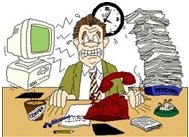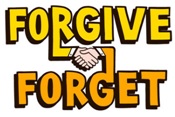|
 |
|
 |
|
|
||
Stress management
Stress management is... Decreasing life’s worries to make it more it more fun and worthwhile. Stress can be negative (anxiety and depression), or positive and challenging (which should be called pressure to save confusion).
How to beat stress
1. Friends and family Make time for people, particularly those you love most. The importance of relationships can be seen from the top stress creators (according to research at the University of Washington). Their relative importance is indicated by the index number:
2. Enjoy your job Stress increases, if you don’t like your job and/or the people you work with (particularly your boss). Research by King’s College, London, shows that the most stressful jobs include teachers and top managers and the least stressful are postmen and librarians.
3. Relax! Relaxers include
4. Health Exercise regularly and eat healthily. Nicotine and caffeine make stress worse by speeding up your heartbeat. Moderate drinking relaxes you but in large quantities alcohol is a depressant and addictive.
5. Seek help Talk through your problems with family and friends. If things get really bad, your doctor can help. The doctor might get you in touch with a psychotherapist, but don’t treat drugs as a long-term solution.
6. Make life easy
7. Take control of your life
8. Purpose and principles
9. Mindfulness Be aware of all the good things around you in people, nature and knowledge. Think about the positive, not the negative.
Key quotes explained
“God grant me the serenity to accept the things I cannot change, the courage to change the things I can, and the wisdom to know the difference” - Reinhold Niebuhr , American theologian (pictured right) This is known as the Serenity Prayer and said at the end of each Alcoholics’ Anonymous meeting. Don’t blame yourself for past mistakes, accept them and concentrate on making your life better now and in the future. Shakespeare in Henry IV Part 1 also warned about the dangers of anxiety (or care) about things you can do nothing about: “Care is no cure, but rather corrosive, for things that are not to be remedied”.
“If you want to be free learn to live simply” - Lao Tzu , Chinese philosopher (pictured right) Cut out unnecessary spending (and the credit cards!), so you don’t have the pressure of earning more. The Russian writer, Leo Tolstoy, summed this up very well: “Our whole life is taken up with anxiety for personal security, with preparation for living, so that we never really live at all”.
“Nothing can bring you peace but the triumph of principles” - Ralph Waldo Emerson, American philosopher (pictured right) Your principles give you something to cling on to when life gets difficult. Particularly helpful are a) a useful, active life Emerson also said: “As a cure for worrying, work is better than whiskey” b) love (which “drives out all fear”, St. John said in the Bible).
“There is more to life than increasing its speed” - Mahatma Gandhi (Indian philosopher and politician, pictured right) Slow down, think about your life and make the right choices (based on morals, not money). “The greatest weapon against stress is our ability to choose one thought over another”, William James, the American psychologist, said.
“Men shut their doors against a setting sun” - Apementus (in Timon of Athens by Shakespeare, pictured right) Face up to your problems (your setting sun) and don’t be afraid of life. “Man’s loneliness is but his fear of life”, the American Eugene O’Neill (pictured right)wrote in one of his plays.
Best books
Hans Selye (pictured right) , Stress Without Distress (1975) An enjoyable, stress free life has purpose and principles (particularly “earn thy neighbour’s love” i.e. love others so they will love you).
Fernando Bartolomé (pictured right) and Paul Evans (pictured right below), Must Success Cost So Much? (1981) Their research in America showed that balance between work and leisure is essential for a happy and successful life. Very long hours reduce your performance.
Paul Tillich (pictured right), The Courage To Be (1952) To overcome anxiety you must have the courage to do something useful and stand up for what you believe in.
| ||||||||||||||||||||
|
|
||
|
|
||
| Copyright © wisdomtowin.com 2025 All Rights Reserved | ||
|





















